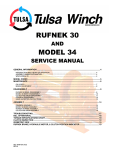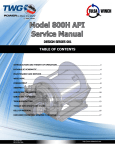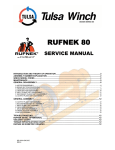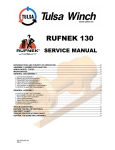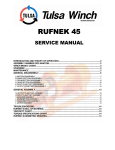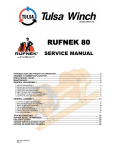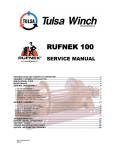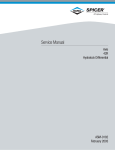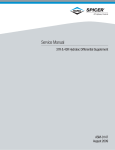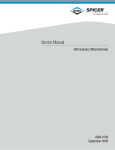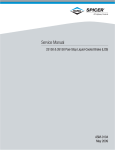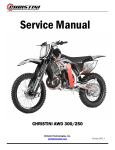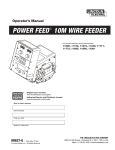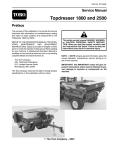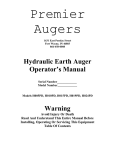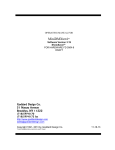Download RN10W Service Manual
Transcript
DESIGN SERIES 001 RUFNEK 10 AND MODEL 1138 SERVICE MANUAL GENERAL INFORMATION .......................................................................................................................... 4 INTRODUCTION AND THEORY OF OPERATION.................................................................................................................. 4 ASSEMBLY NUMBER EXPLANATION ................................................................................................................................... 4 WINCH BREAK-IN .................................................................................................................................................................. 4 MODEL CODE .............................................................................................................................................. 5 MAINTENANCE............................................................................................................................................ 6 OIL LEVELS............................................................................................................................................................................ 7 BRAKE ADJUSTMENT ........................................................................................................................................................... 8 DISASSEMBLY ............................................................................................................................................ 8 BRAKE DISASSEMBLY .......................................................................................................................................................... 8 CLUTCH AND DRUM DISASSEMBLY .................................................................................................................................... 9 GEARBOX DISASSEMBLY..................................................................................................................................................... 9 GEAR INSPECTION INSTRUCTIONS .................................................................................................................................... 10 ASSEMBLY ................................................................................................................................................ 11 GEARBOX ASSEMBLY .......................................................................................................................................................... 11 BRAKE ASSEMBLY................................................................................................................................................................ 11 CLUTCH AND DRUM ASSEMBLY .......................................................................................................................................... 12 TROUBLESHOOTING................................................................................................................................ 13 RUFNEK 10 BILL OF MATERIAL ............................................................................................................. 14 TORQUE SPECIFICATIONS CHART ........................................................................................................ 16 CLUTCH INSPECTION .............................................................................................................................. 17 RUFNEK 10 ISOMETRIC DRAWING ........................................................................................................ 18 SEL-0043-001.DOC REV-0 FAILURE TO HEED THE FOLLOWING WARNINGS MAY RESULT IN SERIOUS INJURY OR DEATH. The safety of the winch operator and ground personnel should always be of great concern, and all necessary precautions to insure their safety must be taken. The primary mover and the winch must be operated with care and concern for the equipment and the environment and with a thorough knowledge of the equipment and its performance capabilities must be understood. These general safety guidelines are offered, however local rules and regulations or national standards may also apply. Recommended references are, but not limited to, ANSI B30, OSHA 1910, AWS D 14.3, and SAE J706. Additional information can be found at http://www.team-twg.com/TulsaWinch/ Indicates an imminently hazardous situation which, if not avoided, will result in death or serious injury. Indicates a potentially hazardous situation which, if not avoided, could result in death or serious injury. Indicates a potentially hazardous situation which, if not avoided, may result in minor or moderate injury or property damage. Indicates information or a company policy that relates directly or indirectly to the safety of personnel or protection of property. Mounting: Winch mounting must be secure and able to withstand the applied loads. • • • • The stability of the mounting system must be approved by a qualified person. All welding should also be done by a qualified person. Winch mount must be flat so as not to induce binding. The flatness must not exceed 1/16 inch across the mounting surface of the winch itself. Guards must be placed on all open drives in the case of mechanical winches. Insure that all hydraulic hoses, valves and fittings are rated to winch manufacturer’s operating pressures. Relief valves should be set to winch manufacturer’s specifications. Insure that all PTO’s and drivelines are sized appropriately for the winch manufactures speed and torque specifications. 2 Operator: Must read and understand the operating and service manual. Both the SERVICE MANUAL and OPERATING MANUAL are available online at http://www.team-twg.com/TulsaWinch/ Must never lift or move people with this winch. This winch is not designed or intended for any use that involves moving people. Must stay clear of the load at all times. Ground personnel should remain a safe distance from the load and winch cable at least 1 ½ times the length of cable measured from the winch to the load. Must stay clear of the cable at all times. A broken cable can cause serious injury or death. Must avoid shock loads. Shock loads can impose a strain on the winch that can be many times the design rating. Must be aware of the fleet angle of the winch. All loads should only be pulled with the load line perpendicular to the drum shaft, this is to avoid excessive stresses on the winch and will help prevent the cable from building on one side of the drum flange. Must wear personnel protective equipment (PPE) if required. Check the local, state and federal regulations for compliance. Must insure that the drum clutch is fully engaged before hoisting. A visual inspection of the drum clutch engagement is required before each winching operation. Must rig all loads secure before winching. Pull the load line taut and inspect the condition of load for stability. Must inspect the drum brake if equipped. The drum brake is not a load holding device it is design to prevent over spooling of the drum and causing bird nesting of the cable on the drum. Inspect the brake for wear of the lining and the actuation method. Must inspect the load control brake. These winches can be equipped with two (2) forms of dynamic braking. The worm brake is one method and is adjustable for pay-out load control. Before a load is handled the load should be pulled tight and stopped to check this brake. The second method is a hydraulic lowering control that is not field adjustable. The same method should be used to check this brake. Operation: • • • • • • All winch controls must be well marked for function to avoid confusion. Insure that the PTO is disengaged when the winch is not in use. All winch controls must be located to provide the operator with a clear view of the load. The clutch must be inspected daily for proper operation. The winch cable should be inspected daily for serviceability. A minimum of five wraps of tightly wound cable must remain on the drum. 3 GENERAL INFORMATION INTRODUCTION AND THEORY THEORY OF OPERATION The Rufnek series worm gear winch is operated by turning the input of the worm using a hydraulic motor or PTO driven sprocket and chain. The winch utilizes an adjustable brake that activates only during pay-out to provide maximum efficiency during pay-in. The torque is transferred from the gearbox through the drum shaft which is keyed to a mechanically actuated sliding clutch that when engaged transfers the torque to the drum. ASSEMBLY NUMBER EXPLANATION EXPLANATION This manual is for design series 001. In the case of a major design change implementation, a new design series designation number will be issued for the winch. A new manual will also be created for that specific design series. ASSEMBLY # DESIGN SERIES 81276 001 WINCH BREAKBREAK-IN Winches, like any other kind of machinery, require a “break-in” to perform well and to maximize their life. The following guidelines should be used in the break-in of Tulsa Winches. Use extreme care when first spooling cable onto the winch. DO NOT run the winch at high speeds when performing this operation. Make sure that the cable is payed-out in a straight line (to prevent kinks) and SLOWLY pay-in the winch to install the cable. DO NOT exceed one half rated load or one half rated line speed for the first thirty minutes of operation. This will insure that the worm and gear have an opportunity to wear in properly. Periodically, check the gearbox for temperature rises and allow the winch to cool down between pulls. Worm gear winches are designed and intended for intermittent duty application only; using them in extremely long pulls may generate excessive heat and shorten the life of the winch. 4 MODEL CODE RN10 WH RF 1 MO Cable Spooling O=Over Drum U=Under Drum (viewed from rear of truck) Gear Type W=Worm P=Planetary Drive Type H=Hydraulic M=Mechanical Gearbox Position L=Left R=Right (viewed from rear of truck) Input Shaft Location F=Front R=Rear X=Does not apply (viewed from rear of truck) Clutch Device M=Mechanical A=Air Motor Type 1. Single Speed Gear Motor 2. Two Speed Gear Motor 3. Single Speed Geroler Motor 4. Two Speed Geroler Motor 5. Piston 6. Vane X. No Motor 5 MAINTENANCE Tulsa Rufnek series worm gear winches require regular maintenance to ensure safe and reliable operation. Routine oil changes with the correct oil for the ambient temperature conditions and a regular inspection of the wear components is strongly recommended. Maintenance Scheduling The owner is to insure proper inspection intervals, in compliance with the API RP 2D Section 4, ANSI B30.5, 5-2.3 or ANSI B30.7, 7-2.1, and will review winch usage categories on a periodic basis. A qualified inspector should perform all maintenance and inspections. USE (HRS PER MONTH) 0-10 11-50 51+ API RP 2D RECOMMENDED INSPECTION SCHEDULE PRE-USE, ANNUAL PRE-USE, QUARTERLY PRE-USE, MONTHLY Oil Maintenance The oil should be changed every 1000 hrs or 6 months of normal usage. • Tulsa Winch recommends that the oil level in the gearbox be checked and adjusted as part of the pre-use inspection. If the oil level drops frequently or oil leakage is detected during an inspection, maintenance should be performed to correct any problems. OIL CAPACITY = .75 QTS • Gearbox oil level inspection is achieved by removing the oil level inspection plug and visually inspecting the oil level. Minimum oil level is to the bottom of the threads of the oil level hole (see page 7 for oil level hole location). Refer to the chart below for the recommended oil type and grade for your application. SAE 140W AGMA 7 EP MOBIL SHC 626 MOBILUBE HD80W140 All oils must meet MIL-PRF2105E standards. Substitution from a reputable manufacturer is allowed as long as type and grade are maintained. 6 OIL LEVELS GEARBOX FILL/VENT GEARBOX OIL LEVEL GEARBOX OIL DRAIN 7 MAINTENANCE CONTINUED BRAKE ADJUSTMENT This brake uses a one way cam clutch (49) allowing free spooling in the in-haul direction and engages in the payout direction. To increase the brake torque, follow the steps listed below. The brake should be adjusted to hold no more than the winch rating. If the brake does not respond to adjustment, the brake must be disassembled and inspected per brake disassembly section of this manual. 1. Loosen the locknut (53). 2. Increase the brake torque by turning the adjusting screw (52) clockwise. Excessive brake torque can cause over heating and premature wear. 3. Tighten the locknut (53) after the brake adjustments are completed. DISASSEMBLY BRAKE DISASSEMBLY 1. Remove the bottom plug (34) to drain the oil. 6. Inspect parts as follows, replace if necessary: 2. Loosen the locknut (53) and brake adjusting screw (52) to reduce spring force on brake housing (45). A. Inspect the friction discs (47) for excessive wear. Friction discs should measure no less than .065-in thick. 3. Remove the capscrews (56) from the brake housing (45). B. Inspect the flat surfaces of the brake hub (46), stator plates (48), and thrust plate (51) for warpage, excessive wear, or other damage. 4. Remove the brake housing (45), thrust washer (51), and spring (50) from the gearbox. C. Examine the spring (50) for any discoloration. 5. Remove the stator plates (48), friction discs (47), brake hub (46), spacer (55), and cam clutch (49) from the worm (30). D. The cam clutch (49) should be free of any debris and have all rollers intact. If cam clutch needs to be replaced, a new cam clutch should be carefully pressed into the brake hub (46). Make sure to note the direction that the cam clutch and brake hub are installed. They must be reinstalled the same way. 8 CLUTCH AND DRUM DISASSEMBLY 1. Remove the four capscrews (12), nuts (15), and washers (16) attaching the end bracket (1) to the frames (13). A. Inspect the bushing (19) in the end bracket (1) for excessive wear. B. Inspect the lever assembly (17), sliding clutch (24), keys (14), and thrust washer (27) for excessive wear. See page 14 for clutch inspection. 2. Remove the end bracket (1), lever assembly (17), sliding clutch (24), and keys (14) from the output shaft (3). 3. Remove the thrust washer (27). C. Inspect the bores of the drum (2) for excessive wear or damage. 4. With the support of a hoist, remove the drum (2). D. Check the drag brake (8) for excessive wear. 5. Inspect parts as follows, replace if necessary: E. Inspect the oil seal (25) for any leaks. GEARBOX DISASSEMBLY 1. Remove the brake from the gearbox. See brake disassembly section of this manual. If the bushing in the gearbox needs to be replaced, a complete teardown is necessary. 2. Remove either the motor (23) or the end cap (58) (depending on type of drive) by removing two capscrews (38). 7. Inspect parts as follows, replace if necessary: 3. Remove the snap ring (32) from the brake end of the worm. A. Inspect the worm (30) for excessive wear, signs of heat checking, or cracks. 4. From the brake end, push the worm while rotating it in order to remove the worm from the gearbox. B. Inspect the bearings (33) for excessive wear or damage. 5. Remove the cover (6) from the gearbox by removing the four capscrews (11). C. Inspect the thrust washers (27), bushing (26), and gear (29) for excessive wear. 6. Remove the thrust washer (27) and gear (29). D. Inspect the keys (28) and output shaft (3) for damage. 9 GEAR INSPECTION INSTRUCTIONS LAND Check gear wear by removing the cover and visually inspecting the bronze gear. If the gear is worn such that there is no visible land on the throat of the gear between the gear flanks as shown in picture above the gear should be replaced. 10 ASSEMBLY GEARBOX ASSEMBLY 1. Install the bushings (26) into the gearbox (4) and cover (6). the worm (30) is in place, install the other bearing (33) and retaining ring (32) onto the worm (30). 2. Install the thrust washer (27) and keys (28) onto the output shaft (3). Slide the gear (29) over the keys (28) and against the thrust washer (27). Slide the other thrust washer (27) onto the output shaft (3). 5. If your winch uses mechanical input, install a new oil seal (59) into the end cap (58). Install the end cap with two capscrews (38). 6. If your winch uses a hydraulic motor. Install the motor (23) and o-ring (35). 3. Install the cover (6) using the four capscrews (11), being careful not to damage the o-ring (10). 7. Fill to the proper oil level with the recommended lubricant. See maintenance section of this manual on page 6. 4. Install one bearing (33) and retaining ring (32) onto the end of the worm (30), then install the worm (30) into the gearbox (4) engaging the gear (29) as you push it through. Once BRAKE ASSEMBLY 1. Insert the following parts into the brake housing (45) in this order: • • • • • • • • • 3. Tighten the brake adjustment screw (52) until tension from the spring (50) is felt. See brake adjusting section of this manual. Thrust washer (51) Spring (50) Stator plate (48) Friction disc (47) Cam clutch/brake hub assembly (46,49) Friction disc (47) Stator plate (48) Brake spacer (55) Gasket (21) Factory preset is 8 ft/lbs @ worm input 4. Fill to the proper oil level with the recommended lubricant. See maintenance section of this manual on page 6. 2. Install the brake assembly onto the gearbox (4) with two capscrews (56). 11 CLUTCH AND DRUM ASSEMBLY 1. If necessary, replace the oil seal (25) in the gearbox (4) 4. Install the sliding clutch (24), lever (17), and end bracket (1). 2. Place some grease into the pockets located on the back of the gearbox (4) and install the springs (9) and drag brakes (8). The grease should hold them in place. 5. Attach the end bracket (1) to the frames using four capscrews (12), nuts (15), and washers (16). 6. Install the plug (34) into the bottom of the gearbox (4). Fill to the proper oil level with the recommended lubricant (see page 6 of this manual). 3. Grease the inside of the drum bore and the output shaft. Install the drum (2) and thrust washer (27) onto the output shaft (3). 12 TROUBLESHOOTING FAILURE Clutch handle won’t latch Oil leaks from housing Load drifts down Winch runs too slow Cable drum won’t free spool PROBABLE CAUSE a) Clutch jaws aren’t aligned. jaws by rotating drum. Align the b) Damaged yoke or linkage. Replace damaged parts. a) Seal damaged or worn. Replace the seal(s). b) Too much gearbox oil. Drain excess oil. a) Oil-cooled brake out of adjustment or worn. Adjust brake until load doesn’t drift. Replace the parts as required. a) Low flow rate. Check the flow rate and increase if necessary. b) Hydraulic motor worn out. Replace the motor. a) Winch not mounted squarely. Check mounting and confirm that the winch is mounted on a flat surface. b) Clutch not disengaged. Disengage the clutch. Cable birdnests when clutch is a) Drag brakes are worn. Replace the disengaged. drag brakes. Hydraulic fluid leaks from the gearbox a) Damaged motor shaft seal. Replace the seal. Winch won’t pick up heavy loads. a) Too much cable on the drum. Use the snatch block or remove some cable from the drum. b) System pressure too low. Increase the hydraulic system pressure. c) Winch not broke-in. Run winch at half of rated load for several pulls. 13 RUFNEK 10 BILL OF MATERIAL 81276001-BOM SEPTEMBER 2005 ITEM 1 2 3 4 5 6a 6b 7 8 9 10 11 12 13 14 15 16 17 17-1 17-2 17-3 17-4 17-5 17-6 17-7 17-8 18 19 20 21 22 23 24 25 26 27 28 29 30a 30b 31 32 33 34 QTY 1 1 1 1 1 1 1 1 3 3 1 4 8 2 2 8 8 1 1 1 1 1 2 1 1 2 -1 -2 1 1 1 1 2 3 2 1 1 1 -2 2 2 P/N 41207 41190 41193 41188 12208 44046 41192 23582 25692 25774 40547 40407 10381 41197 25762 20521 20518 4069 41185 20296 20299 20304 33786 20723 20116 24724 -41238 -40147 13050 40121 20712 11637 41196 40510 40518 41198 40598 40635 -40396 40395 32220 DESCRIPTION END BRACKET DRUM OUTPUT SHAFT HOUSING BUSHING RUFNEK 10W COVER MODEL 1138 COVER SET SCREW DRAG BRAKE SPRING O-RING CAPSCREW CAPSCREW FRAME KEY NUT LOCKWASHER LEVER ASSEMBLY YOKE PIN SPRING PIN FLAT WASHER BRACKET PIN RETAINING RING OMIT BUSHING OMIT GASKET BREATHER HYDRAULIC MOTOR CLUTCH OIL SEAL BUSHING THRUST WASHER KEY GEAR WORM (HYDRAULICALLY DRIVEN) WORM (MECHANICALLY DRIVEN) OMIT RETAINING RING BEARING PLUG 14 RUFNEK 10 BILL BILL OF MATERIAL 35 36 37 38 39 40 41 42 43 44 45 46 47 48 49 50 51 52 53 54 55 56 57 58 59 60 61 62 63 1 --2 2 2 2 1 1 1 1 1 2 2 1 1 1 1 1 1 1 2 -1 1 1 1 1 1 32566 --40410 20270 20271 20526 41244 41250 21128 40069 40617 40075 40076 40113 40077 40078 40775 40774 29044 40599 40546 -40082 20232 20105 20092 20278 44024 CONTINUED O-RING OMIT OMIT CAPSCREW CAPSCREW NUT LOCKWASHER C.T.O. HANDLE HANDLE GRIP GREASE ZERK BRAKE HOUSING BRAKE HUB FRICTION DISC STATOR PLATE CLUTCH CAM SPRING THRUST WASHER SET SCREW LOCKNUT WASHER BRAKE SPACER CAPSCREW OMIT END CAP OIL SEAL KEY WASHER CAPSCREW RUFNEK PLATE 15 TORQUE SPECIFICATIONS SPECIFICATIONS CHART Dry SAE Grade 5 Torque *(Ft-Lbs) Plated SAE Grade 5 Torque *(Ft-Lbs) Lubricated SAE Grade 5 Torque *(Ft-Lbs) Dry SAE Grade 8 Torque *(Ft-Lbs) Plated SAE Grade 8 Torque *(Ft-Lbs) Lubricated SAE Grade 8 Torque *(Ft-Lbs) Nominal Size 1/4 20 8 6 5 12 9 7 1/4 28 10 7 6 14 10 8 5/16 18 17 13 10 25 18 15 5/16 24 19 14 11 27 20 16 3/8 16 31 23 19 44 33 26 3/8 24 35 26 21 49 37 30 7/16 14 49 37 30 70 53 42 7/16 20 55 41 33 78 58 47 1/2 13 76 57 45 106 80 64 1/2 20 85 64 51 120 90 72 9/16 12 109 82 65 153 115 92 9/16 18 122 91 73 172 129 103 5/8 11 150 113 90 212 159 127 5/8 18 170 128 102 240 180 144 3/4 10 266 200 160 376 282 226 3/4 16 297 223 178 420 315 252 7/8 9 430 322 258 606 454 364 7/8 14 474 355 284 668 501 401 1 1 8 644 483 386 909 682 545 14 721 541 433 1019 764 611 1-1/8 7 794 596 475 1288 966 772 1-1/8 12 890 668 534 1444 1083 866 1-1/4 1-1/4 7 12 1120 1241 840 930 672 745 1817 2012 1363 1509 1090 1207 T = BOLT TORQUE (LB. FT.) T = (KWD) / 12 K = TORQUE COEFFICIENT (K = 0.20 DRY K = 0.15 PLATED K = 0.12 LUBRICATED) W = PRELOAD TENSION D = NOMINAL BOLT SIZE (IN.) * ALL TORQUE VALUE TOLERANCES ARE ± 5% 16 CLUTCH INSPECTION 17 RUFNEK 10 ISOMETRIC DRAWING 18


















